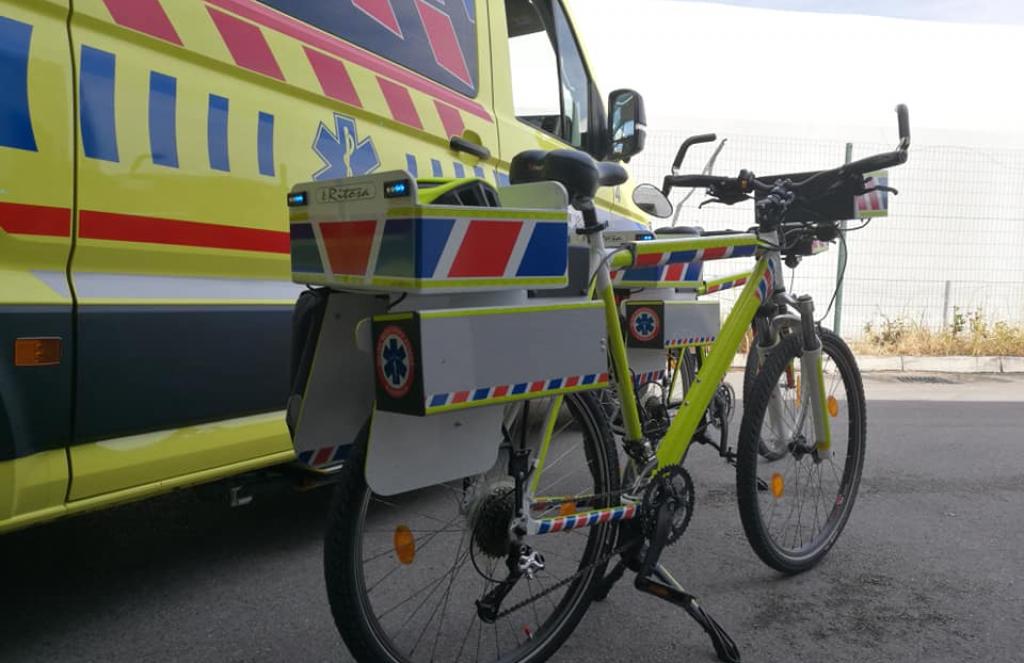Thessaloniki gets ready for its metro launch in November
The underground rapid transit lines have been under construction for almost two decades due to various project delays
 TheMayor.EU logo
TheMayor.EU logo 
The bike ambulance is fully equipped and ready to go when needed, Source: Reševalna služba slovenske Istre
Paramedics on wheels have the ability to provide more mobile, flexible and rapid healthcare services
Izola is a small coastal city in Slovenia, which charms with its fishermen's heritage and Italian-style architecture. Visitors to that town have also been able to enjoy kind of a unique service in the past four years – paramedics on bicycles. The project came to life four years ago with two of the rescuers’ own bicycles and the voluntary work of employees of the Rescue Service of Slovenian Istria (Reševalne službe slovenske Istre).
The idea itself is even a little bit older, though. It first came about as a concept more than ten years ago in relation to providing more efficient first aid services to participants in the Istrian Marathon taking place there.
Igor Crnić from the Izola Health Center explained for Radio Slovenia how the idea was born. "When we realized that the paramedics have to follow (the race participants) even where the ambulance cannot, and that they have to get to the scene of the accident as quickly as possible so that the injured or accident victim can more easily wait for the ambulance."
This story shows the adaptability and the advantages that soft mobility devices can hold over motorized vehicles, especially in narrow and crowded public spaces. The rescuers now ride on specialized electric bicycles, which are adapted for riding on unpaved paths and are fully equipped.
"Everything that is in an ambulance is also on a bicycle, but in a much smaller quantity." For the record, last summer, they intervened 26 times.
The paramedics on bicycles are on site every weekend in the summer and during holidays between 9 a.m. and 5 p.m. They are connected to the dispatch centre, which is aware of their location at all times and, if necessary, calls them in to intervene.
"We also enter nearby settlements in the Izola area, if the dispatcher sends us, otherwise we do not patrol there. We only do this along the sea from Simon's Bay to Svetilnik and along Parencana along the sea to the border with the Koper municipality," added Igor Crnić.
The most common cases were cases of sudden weakness and injuries, which were treated directly on the ground, thus relieving the emergency medical aid system somewhat, says Crnić, who is satisfied that the project is no longer dependent on volunteer work: "The Municipality of Izola pays the Health Centre Izola, which, according to the contract, pays the rescuers who perform the work. But we'll see how it goes in the future."

The underground rapid transit lines have been under construction for almost two decades due to various project delays

Now you can get your wine in Talence by paying directly in Bitcoin

That’s because the state has to spend money on updating the railway infrastructure rather than subsidizing the cost of the popular pass

Rethinking renewable energy sources for the urban landscape

The examples, compiled by Beyond Fossil Fuels, can inform and inspire communities and entrepreneurs that still feel trepidation at the prospect of energy transition

Now you can get your wine in Talence by paying directly in Bitcoin

The 10th European Conference on Sustainable Cities and Towns (ESCT) sets the stage for stronger cooperation between the EU, national and local level to fast track Europe's transition to climate neutrality.

At least, that’s the promise made by the mayor of Paris, Anne Hidalgo

The underground rapid transit lines have been under construction for almost two decades due to various project delays

At least, that’s the promise made by the mayor of Paris, Anne Hidalgo

Hostal de Pinós is located in the geographical centre of the autonomous region

Despite its church-y name, the district has long been known as the hangout spot for the artsy crowds

Urban dwellers across the EU are having a say in making their surroundings friendlier to people and the environment.

Forests in the EU can help green the European construction industry and bolster a continent-wide push for architectural improvements.

Apply by 10 November and do your part for the transformation of European public spaces

An interview with the Mayor of a Polish city that seeks to reinvent itself

An interview with the newly elected ICLEI President and Mayor of Malmö

A conversation with the Mayor of Lisbon about the spirit and dimensions of innovation present in the Portuguese capital














